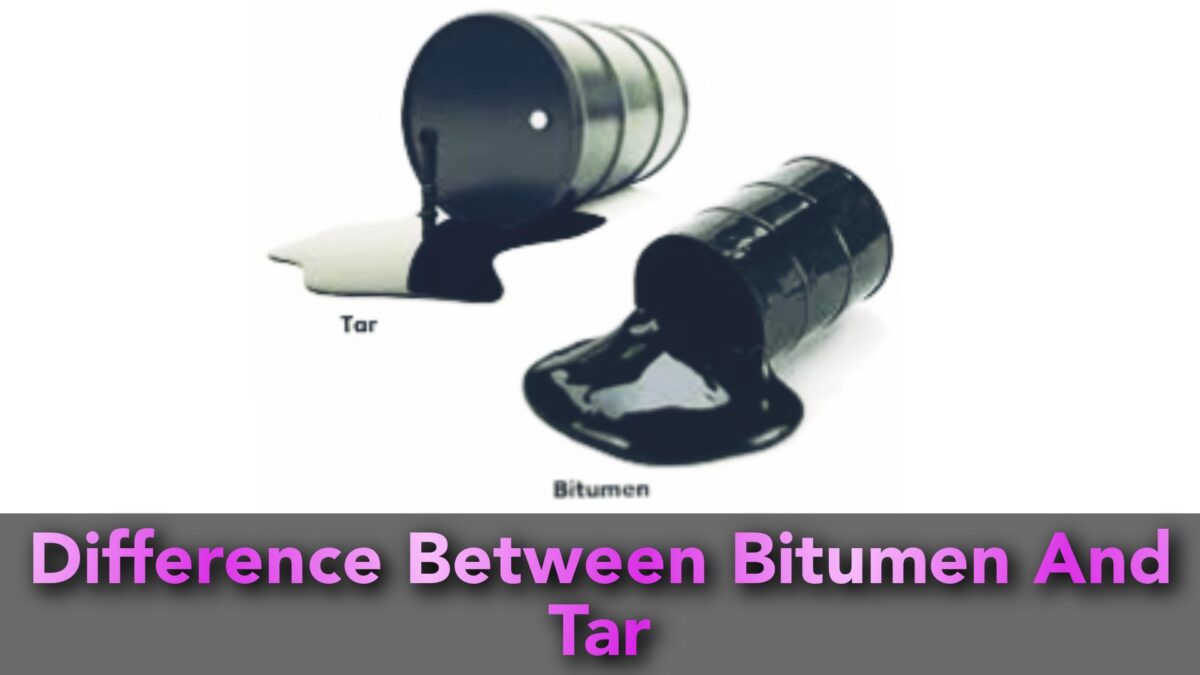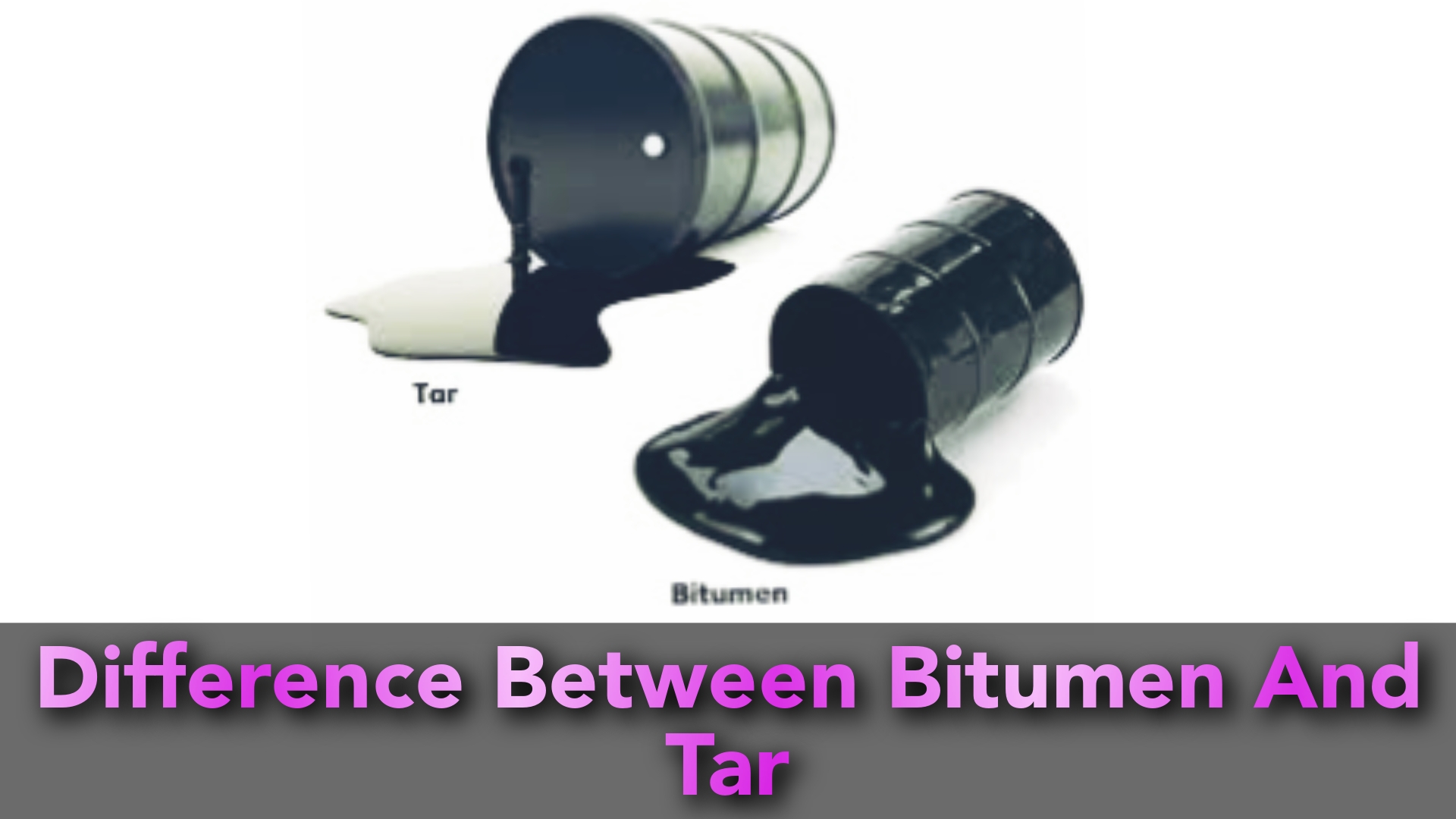In this blog article, we will know difference between tar and bitumen.

Let’s start!
Table of Contents
What Is The Main Difference Between Bitumen And Tar?
Bitumen comes from petroleum, while tar is made from burning things like coal or wood. Bitumen is used to make roads strong, while tar is used for waterproofing and roofing.
Bitumen Vs Tar: All Differences
In the below table, I have described all the differences between bitumen and tar. This table will help you a lot.
| Bitumen | Tar |
|---|---|
| Bitumen is a dark, sticky substance. | Tar is also a dark, sticky substance. |
| It is derived from crude oil. | It is made from coal or wood. |
| Bitumen is used to make asphalt. | Tar is used for road construction. |
| It is often used for roofing. | Tar is not commonly used for roofing. |
| Bitumen is more flexible. | Tar is less flexible. |
| It is resistant to water. | Tar is not as resistant to water. |
| Bitumen is less soluble in water. | Tar can dissolve in water. |
| It is commonly used in pavement sealing. | Tar is used for pavement repairs. |
| Bitumen has a higher melting point. | Tar has a lower melting point. |
| It is a common binder in road construction. | Tar is not commonly used as a binder. |
| Bitumen is a natural resource. | Tar is a man-made substance. |
| It can be found in oil sands. | Tar is produced through a heating process. |
| Bitumen is solid at room temperature. | Tar is a liquid at room temperature. |
| It is less toxic. | Tar can be toxic. |
| Bitumen has a lower viscosity. | Tar has a higher viscosity. |
| It is often used for waterproofing. | Tar is not typically used for waterproofing. |
| Bitumen is more commonly used in cold climates. | Tar is more commonly used in warm climates. |
| It is used in making shingles. | Tar is not used in making shingles. |
| Bitumen is not as flammable. | Tar is highly flammable. |
| It is commonly used in road repairs. | Tar is used for filling cracks in roads. |
| Bitumen is more resistant to temperature changes. | Tar is less resistant to temperature changes. |
| It is softer than tar. | Tar is harder than bitumen. |
| Bitumen is more environmentally friendly. | Tar is less environmentally friendly. |
| It is used in making adhesives. | Tar is not commonly used in adhesives. |
| Bitumen is less sticky in hot weather. | Tar becomes stickier in hot weather. |
| It is often used for parking lots. | Tar is not commonly used for parking lots. |
| Bitumen is more durable. | Tar is less durable. |
| It is resistant to UV radiation. | Tar is not as resistant to UV radiation. |
| Bitumen is commonly used in road surfacing. | Tar is used for road paving. |
| It is used in making roofing felt. | Tar is not used in making roofing felt. |
| Bitumen is smoother. | Tar creates a rougher surface. |
| It is used for making soundproofing materials. | Tar is not used for soundproofing. |
| Bitumen is commonly used in bike lanes. | Tar is not commonly used in bike lanes. |
| It is used in making paint. | Tar is not commonly used in paint. |
| Bitumen has a longer lifespan. | Tar has a shorter lifespan. |
Faqs
Yes, bitumen and tar can be recycled. In road construction, old asphalt pavements can be reclaimed and processed to produce recycled asphalt, which can be used to build new roads. This recycling process helps conserve natural resources and reduces the amount of waste going to landfills.
Bitumen and tar are known for their durability and longevity. When properly applied and maintained, roads constructed with bitumen or tar can last for several decades. Regular maintenance, such as crack sealing and resurfacing, can further extend their lifespan.
Yes, both bitumen and tar are flammable substances. They can catch fire when exposed to high temperatures or open flames. It is important to handle and store them safely, keeping them away from potential ignition sources.
Yes, bitumen and tar have various applications beyond road construction. Bitumen is used in waterproofing materials, such as roofing membranes and coatings for buildings. Tar is used in the production of coal tar pitch, which is utilized in the manufacturing of electrical cables, roofing materials, and paints.
Researchers and engineers are constantly exploring alternative materials for road construction. Some promising alternatives to bitumen and tar include bio-bitumen derived from plant-based sources, recycled plastics, and asphalt mixtures incorporating additives like rubber from recycled tires. These alternatives aim to reduce the environmental impact and improve the sustainability of road construction.

